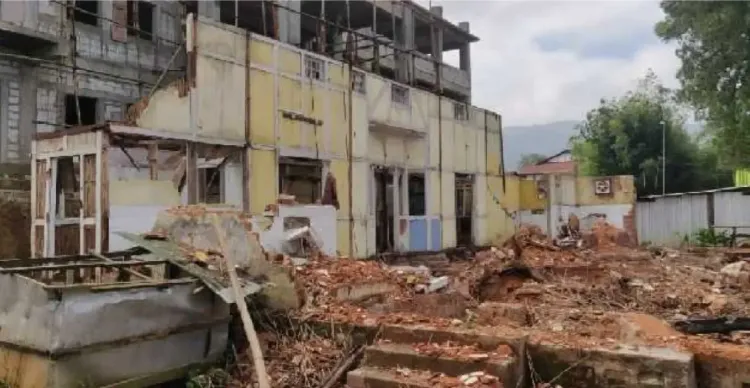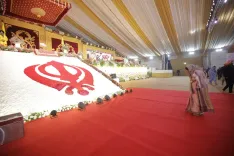Why Was the Historic Redlands Building Demolished in Shillong?

Synopsis
Key Takeaways
- Redlands Building was a key historical site.
- Demolition occurred during a crucial visit by Meghalaya’s Chief Minister.
- Widespread outrage from heritage groups and local communities.
- Calls for accountability and preservation are growing.
- A high-level inquiry into the demolition has been announced.
Imphal/Shillong, Oct 10 (NationPress) The demolition of Shillong’s historic Redlands Building on Friday has sparked widespread shock and indignation across both Manipur and Meghalaya.
This controversial structure, also known as Manipuri Rajbari, was erected in the 1940s and is significant for being the location where the Manipur Merger Agreement was signed on September 21, 1949, between Maharaja Bodhachandra and officials of the Union of India. Following this agreement, the former princely state of Manipur became part of the Indian Union in October 1949.
Coincidentally, the demolition coincided with a visit from Meghalaya Chief Minister and National People’s Party President Conrad K. Sangma, who was in Imphal to evaluate the ongoing ethnic unrest in Manipur.
Sangma stated to the media in Imphal that his government had no part in the demolition, emphasizing that the Meghalaya government did not authorize this action.
“From what I’ve gathered through phone conversations, it’s confirmed that the Meghalaya government has no role and no permissions were granted,” Sangma expressed before heading to Dimapur in Nagaland for discussions with Kuki-Zo tribal leaders.
Highlighting the significance of preserving heritage sites, the visiting Chief Minister announced an intention to conduct a high-level inquiry to understand how this demolition transpired.
“Our stance has always been clear: such a site of historical importance must be conserved. I will certainly investigate it, as it occurred within my jurisdiction,” Sangma said.
The Redlands Building, which served as the residence of Maharaja Bodhachandra Singh, was vital to the history of Manipur.
Despite numerous appeals from heritage organizations and former Union Minister Dr. Rajkumar Ranjan Singh to protect the site, the building was demolished, reportedly to pave the way for a new Manipur Bhavan.
This decision has faced severe backlash from various groups, including the Meitei Heritage Society, historians, scholars, and citizens who label the demolition as a significant loss to both Manipur’s political and cultural legacy.
In Manipur, many are calling for accountability from both state governments for permitting the destruction of what they view as a “monument of historical betrayal and remembrance.”
Congress’s Lok Sabha Member from Inner Manipur, Angomcha Bimol Akoijam, expressed profound concern regarding the demolition, describing it as a direct attack on the dignity and history of Manipur.
“It is disheartening. I visited that site long ago, and even then, I felt we lacked the ability to care for our historical heritage. The Redlands Building is integral to Manipur’s history, despite its location outside the state,” Akoijam told the media.
He reminisced about the building's importance as the residence of Maharaja Bodhachandra and the site of the Manipur Merger Agreement signing.
“The destruction is shocking. It feels as if someone is attempting to erase a vital historical moment and eliminate any evidence of our past,” the academician turned politician lamented.
He further asserted that the site should have been safeguarded under heritage laws and developed into a tourist destination.
According to him, it is not only relevant to Manipur's history but also to India's history and the formation of the nation in 1947 as a post-colonial state. The parliamentarian demanded the restoration and reconstruction of the Redlands Building in its original form and urged the government of India to declare and preserve it as a National Heritage site.









